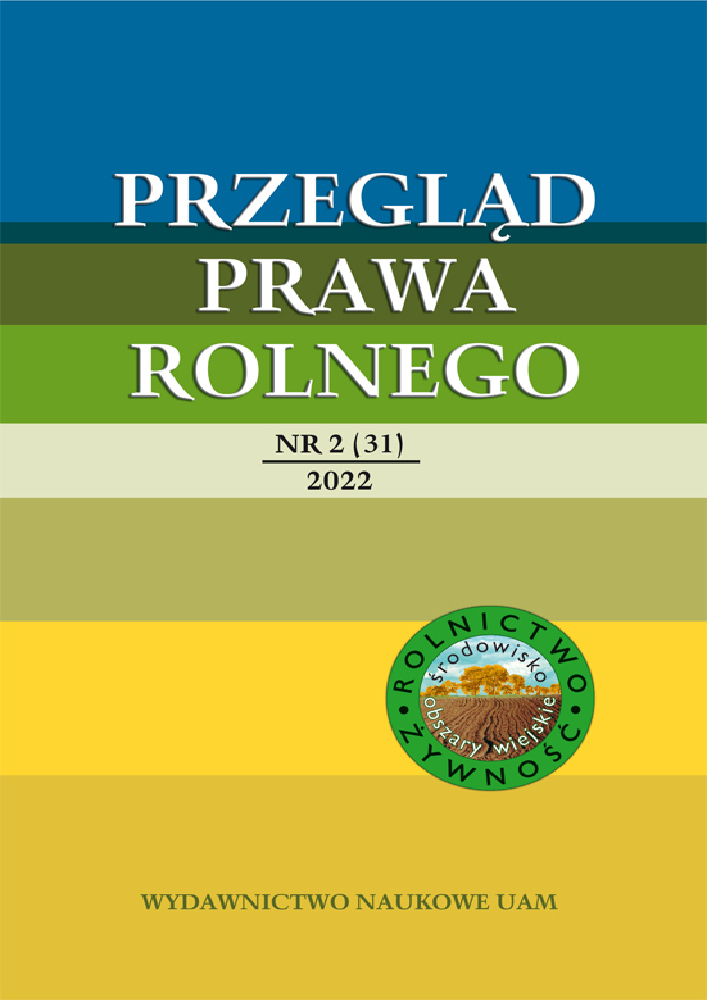Abstract
The aim of the study was to answer the question whether the new legal regulations intended to protect consumers against unreliable organic marketing (“greenwashing”) are sufficient. In this regard, the conditions of organic production, the principles of certification, the labelling of organic products, the marketing practices and the sanctions for the violation of organic farming responsibilities have been analysed. It has been determined, among other things, that the clarification in the new legislative acts of the procedures needed to be completed in order to take up organic production, as well as the operation of the control and certification system, will certainly ensure to a much higher degree the desired quality of an organic product. This objective will also be achieved owing to the harmonisation of the labelling of organic products and the now mandatory requirement to provide information on the product origin. Furthermore, the sanctions for non-compliance with organic farming regulations, now elaborated and clarified in more detail in the legal provisions adopted, may also be seen as strengthening consumer protection against unreliable organic marketing. The sanction that seems of particular value is the conditioning of the amount of the fine on the extent of the financial benefit that the operator concerned has obtained or could obtain for products marketed contrary to the organic production conditions is another factor.
References
Bułacz B. (2020), Znaki towarowe w marketingu ekologicznym, „Kwartalnik Urzędu Patentowego RP” nr 2(45).
Chmielewska M. (2018), Żywność pochodząca z produkcji ekologicznej. Obowiązki producenta, "Biuletyn Euro Info" 2018, nr 2(179). https://doi.org/10.29119/1641-3466.2018.117.21
Fert B. (2015), Nierzetelny marketing ekologiczny (greenwashing) - opis zjawiska i próba jego kwalifikacji prawnej, "Przegląd Prawa Ochrony Środowiska" nr 2. https://doi.org/10.12775/PPOS.2015.023
Groszyk J. (2022), Rolnictwo ekologiczne w Polsce w kontekście strategii unijnych, „Infos” nr 4(296).
Grzybowska-Brzezińska M. (2013), Wpływ instrumentów marketingu ekologicznego na zachowania konsumentów na rynku produktów spożywczych, „Marketing i Zarządzanie” nr 30.
Kotler Ph. (1994), Marketing. Analiza, planowanie, wdrażanie i kontrola”, Warszawa.
Leśkiewicz K. (2010), Sankcje w rolnictwie ekologicznym, „Przegląd Prawa Rolnego” 2010, nr 1.
Leśkiewicz K. (2014), Nowe spojrzenie na rolnictwo ekologiczne – aspekty prawne, „Przegląd Prawa Rolnego” nr 2. https://doi.org/10.14746/ppr.2014.15.2.7
Łuczka-Bakuła W. (2007), Rynek żywności ekologicznej, Warszawa.
Łuczka W. (2016), Stan badań nad rolnictwem ekologicznym w Polsce, „Prace Naukowe Uniwersytetu Ekonomicznego we Wrocławiu” nr 453.
Nestoruk I. (2011), Greenwashing, czyli nierzetelny marketing ekologiczny w prawie amerykańskim, „Radca Prawny” nr 7–8.
Niewiadomski A. (2017), Prośrodowiskowe determinanty polskiej i europejskiej polityki rolnej, „Studia Iuridica Lublinensia” t. XXVI, nr 1.
Prutis S. (2013), Regulacje prawne produkcji ekologicznej w rolnictwie polskim, "Studia Iuridica Agraria" nr 11. https://doi.org/10.15290/sia.2013.11.03
Przybojewska I. (2022), Greenwashing w kontekście unormowań prawnych, "Prawne Problemy Górnictwa i Ochrony Środowiska" nr 1. https://doi.org/10.31261/PPGOS.2022.01.07
Rudawska E. (2013), Marketing zrównoważony – nowe oblicze kapitalizmu? „Ekonomia” nr 3.
Sazońska B., Sambor K., Gajewska M., Stachowicz T., Krysztoforski M., Litwinow A., Pomykała D., Gradka I. (2021), Gospodarowanie ekologiczne – co każdy rolnik wiedzieć powinien? Materiały szkoleniowe dla rolników posiadających certyfikowane gospodarstwa ekologiczne, Radom.
Sieradzka M. (2008), Komentarz do ustawy o przeciwdziałaniu nieuczciwym praktykom rynkowym, Warszawa, LEX/el.
Trempała M. (2013), Odpowiedzialność za wprowadzenie konsumentów w błąd poprzez sugerowanie szczególnych właściwości żywności, „Przegląd Prawa Rolnego” nr 2.
Wolska M. (2021), Znakowanie produktów rolnych za pomocą określenia „bio”. Glosa do wyroku NSA z dnia 11 lipca 2017 r., II GSK 2934/15, „Orzecznictwo Sądów Polskich” nr 2.
Zaremba-Warnke S. (2009), Pojęcie marketingu ekologicznego, w: S. Zaremba-Warnke (red.), Marketing ekologiczny, Wrocław.
License
Copyright (c) 2022 Izabela Hasińska

This work is licensed under a Creative Commons Attribution-ShareAlike 4.0 International License.





